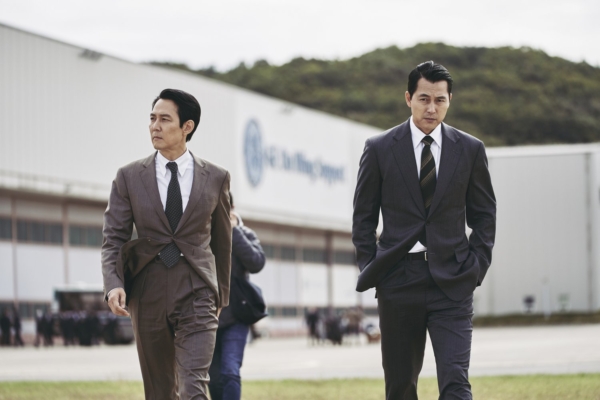In the 1980s-set Hunt, two branches of the South Korean security agency find themselves investigating the unlikeliest of targets: each other. Both sides remain on high alert after an assassination attempt on the country’s president, while two high-ranking agents strive for what they believe is the good for South Korea’s future, albeit through unethical methods. But the fallout is as chilling as it is overly convoluted, making Hunt a long-winded, twist-heavy espionage thriller with solid action in the middle.
One could argue the film’s selling point is its director and star: Lee Jung-jae. Though filming on Hunt began long before Squid Game, it’s indisputable that Lee’s career has entered the public eye internationally thanks to the Netflix show’s absolute pop culture dominance and his subsequent Emmy win. Squid Game showed us the power of Lee’s acting skills, and Hunt, while imperfect, highlights his eye for cinematography too. The world he crafts is a morally dubious one, full of conflicting political allegiances, institutional corruption, and anger at the system from both the masses and from within. It just requires continuous logical leaps to buy so many of the major twists, even as a piece of historical fiction.
After foiling the aforementioned assassination during the South Korean president’s visit to the United States, Korean Central Intelligence Agency members Park Pyong-ho (Lee) and Kim Jung-do (Jung Woo-sung) confront a new dilemma: the KCIA has been infiltrated by a North Korean spy, codename Donglim. Little about Donglim is known, but the results of his deception are evident when a covert-operation mission into North Korea goes horribly wrong. Matters eventually take on a dark turn once Park and Kim’s interrogations turns inward, toward their respective departments and each other in particular. The more Park, the chief of the foreign unit, and Kim, in charge of domestic surveillance, suspect the other of being the mole, the more likely their misgivings threaten to destabilize the country’s security.
Naturally it gets worse from there. As Park and Kim research each other’s pasts for leaks, we gradually learn what principles drive each agent’s commitment to the government they serve. For Kim, it’s based on his military background, having witnessed South Korea’s despotic tendencies following the Gwanju Uprising. For Park, it’s his complicated relationship with Yoo-jung (Go Yoon-jung), the daughter of a former contact with whom he acts like a surrogate father, albeit rather coolly. But in this investigation, few moral boundaries hold sway, with both parties resorting to underhanded tactics—including torture—to get what they want.
Though Hunt pulls from a few South Korean historical events, like the 1983 Rangoon bombing, its story is mostly fictitious, a “what if” interpretation that uses real events as a backdrop for chaotic set pieces and acts of political sabotage. In both cases, the film asks you to sympathize with two sides whose tactics aren’t all that virtuous. Countless scenes are devoted to the KCIA’s use of breaking suspects’ limbs and brutally interrogating them to coax out a confession. It’s not just sickening but deeply nihilistic—you’re not meant to feel as if anyone’s winning this inquiry, especially once Hunt unveils its biggest twists.
Unfortunately, these twists feel too random when you step back and reexamine the story as a whole. They simply happen, leaving us to speculate a character’s next explosive or plausibly dangerous secret before arriving at the latest firefight. However, these action scenes are well handled. Compared to most American films, there’s a real explosive grittiness to them: tense, well-shot, and brutal in how many blood squibs go off with the gunshots. People don’t just walk off a bullet when hit. They die—often without warning—and injuries sustained actually carry over until the fight ends. Here Lee’s direction is at his strongest, making every encounter with snipers, enemy soldiers, or even a fellow agent feel like nerve-wracking impasse.
It’s when Hunt isn’t pointing a gun at someone that the cracks become more noticeable. Nothing in the film is inherently bad, including Lee and Jung performances as the Infernal Affairs–like dueling sleuths. But espionage thrillers can’t just keep the audience guessing: They need to explain how the answers made sense in retrospect. Too many coincidences in a government agent’s line of work indicate a pattern, but in a movie, it’s simply called shock value.

















Leave A Comment